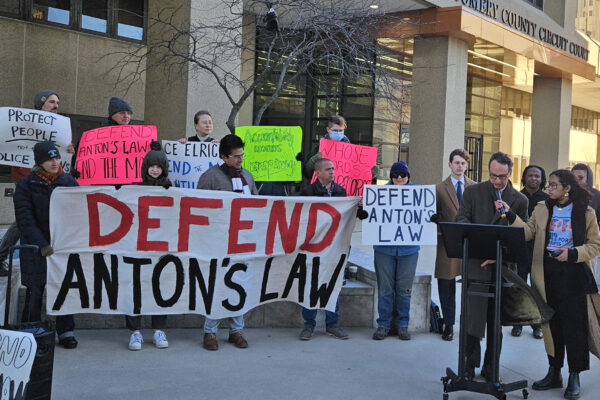Learn more about Anton’s Law and the MCJPA legal intervention
Side Deal Between FOP, Montgomery County Threatens Public Access to Misconduct Records
ROCKVILLE, MD – Calling for police transparency and accountability, the Maryland Coalition for Justice Police Accountability (MCJPA), the ACLU of Maryland, the Silver Spring Justice Coalition, and Vanderbilt Law School today held a press conference before a court hearing related to the Montgomery County Fraternal Order of Police (FOP) challenge to Anton’s Law. The Montgomery County Circuit Court heard arguments today on what information in the lawsuit will remain secret.
Zakiya Sankara-Jabar from Racial Justice NOW! and the Silver Spring Justice Coalition, said: “It is shameful that our County is leading the effort to undermine Anton’s Law and the transparency in policing that it created. We call on our County Executive, Marc Elrich, to end his illegal agreement with the FOP and make sure his County Attorney zealously defends against this lawsuit.”
Speakers at the press conference included Delegate Gabe Acevero, Montgomery County Councilmember Kristin Mink, and Alexa Renehan, who originally requested the police records. The groups also shared information about their police accountability legislative agenda for the 2024 Maryland General Assembly.
Delegate Gabe Acevero said: “The best disinfectant for corruption and abuse is more transparency not less. We are here today because we understand you can’t have accountability, and you can’t mend a relationship between law enforcement and the communities, without transparency. So we want an end to the County Executive’s side deal with the FOP that continues to shield abusive MoCo police officers. We need people to know that the FOP Lodge 35 is attempting to undermine important state legislation that we at the General Assembly passed. We won’t let them do it today, next month or ever.”
Montgomery County Councilmember Kristin Mink said: “The spirit of Anton’s Law is clear, and frankly, I believe the letter of it is, too. I hope the courts will agree. Regardless, the County should be prioritizing the accountability and transparency demanded by the public with the passage of Anton’s Law, not undermining the hard-won efforts of historic policing reforms.”
Passed by the General Assembly in 2021 following years of effort by state community activists, Anton’s Law finally allows the public to access police misconduct records. But the Montgomery County Fraternal Order of Police (FOP) filed a lawsuit seeking to prevent Montgomery County from releasing records made public under the law, and asking the judiciary to rewrite the law to prevent the release of records that the General Assembly said should be public. They later amended the lawsuit to challenge the constitutionality of Anton’s Law itself. The FOP lawsuit was enabled by an improper side deal with the County, which gave the union notice of records requests and the opportunity to review responses before they were sent, thus allowing them to intervene to block disclosure. Unacceptably, the County also agreed to the FOP’s request to keep the arguments in the lawsuit a secret from the public, too.
David Rocah, senior staff attorney with the ACLU of Maryland, said: “It is bad enough that Montgomery County has helped undermine Anton’s Law through its agreement with the FOP. But the County’s example has already metastasized to Baltimore County, which has done the exact same thing through a police policy. The fact that county officials across the state are undermining the disclosure obligations of Anton’s Law through union agreements or police policies is completely unacceptable, and shows why transparency is so important, and why this case is so important. Misconduct thrives in secrecy.”
Several other parties joined the lawsuit to ensure the court arguments would be public, to defend Anton’s Law, and protect the public’s right to receive information. These parties include the Maryland Coalition for Justice and Police Accountability, the Reporters Committee for Freedom of the Press, The Washington Post, and the resident who originally requested the police records, Alexa Renehan. The outcome of this case will have significant consequences for the public’s right to access information in Maryland. At stake is the legacy of Anton’s Law and everything it represents about the fight to increase transparency and seek government accountability.
Sergio España, ACLU of Maryland director of engagement and mobilization, on behalf of MCJPA said: “The Maryland Coalition for Justice and Police Accountability will take police accountability issues head on in the General Assembly this session. In addition to defending against legislative attempts to undermine or rollback Anton’s Law, MCJPA will introduce a bill to clarify that local governments have the authority to give their Police Accountability Boards independent investigatory powers. These powers are a key feature of successful oversight boards around the country. And they are instrumental in ensuring that our local PAB’s can serve as truly independent and responsive oversight bodies.”
Related Content
Stay Informed
Sign up to be the first to hear about how to take action.
By completing this form, I agree to receive occasional emails per the terms of the ACLU’s privacy statement.
By completing this form, I agree to receive occasional emails per the terms of the ACLU’s privacy statement.


